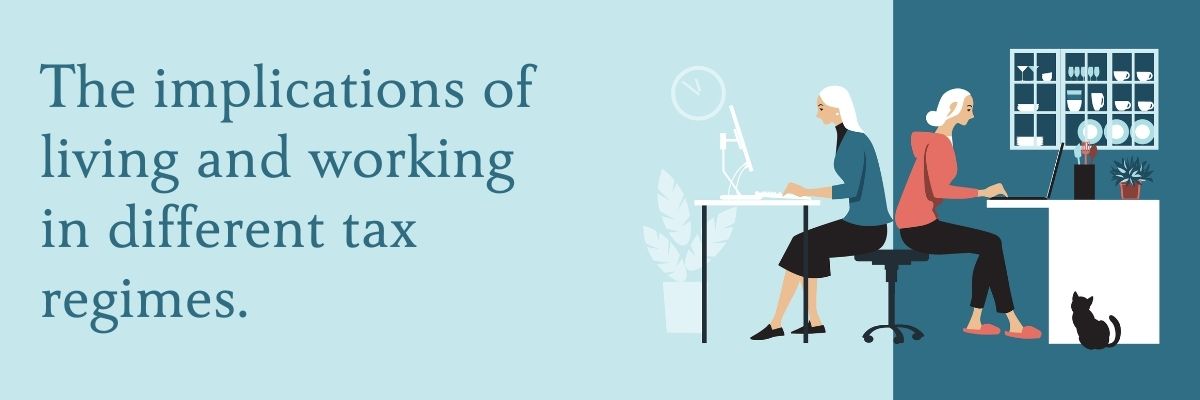Living in one country, working in another – what are the tax implications?

At the height of the COVID-19 pandemic, working practices changed across the world when national governments urged employees to work from home where possible. In the UK, this triggered somewhat of a working-from-home revolution.
Recent reports by the Office for National Statistics (ONS) show an increase in both homeworking and hybrid working on a permanent basis. This was particularly noticeable in certain industries such as information and communication. Top reasons cited include:
- improved employee wellbeing
- reduced overheads for employers
- cheaper rents and better work-life balance for employees.
One aspect that is sometimes overlooked is the tax implications, particularly where the employee lives in a different tax regime to his or her place of work.
Consider, for example, someone choosing to return to live in their native Scotland and work remotely for a London-based employer. While this might give significant savings in rent and other bills, there may be more income tax to pay.
The Scotland Act 2016 gave the Scottish Government the power to set its own income tax rates and bands for Scottish taxpayers. This means that Scottish tax residents do not pay income tax according to the UK rates and bands on their non-savings and non-dividend income.
If you live in Scotland for 183 days in a tax year, you will be classed as a Scottish tax resident for the whole year. As a result, you will be liable to Scottish taxes on all of your earned income for the year.
Currently, a Scottish resident earning £50,000 per annum will pay almost £1,500 more in income taxes than someone living in the rest of the UK earning the same amount.
If you use two homes, one in Scotland and one in the rest of the UK, the problem becomes more complicated. It is possible to be classed as a Scottish tax resident even if you spend less than 183 days in Scotland during the tax year. This could be the case where someone’s wider tax links, such as family ties, social links, personal property in Scotland are more substantial than the ongoing links they have retained in the UK.
On the flip side, Scottish residents who relocate to the rest of the UK may benefit from the lower income tax rates. This is dependable on the income earned.
It should be noted that lower income tax payers who relocate to Scotland may benefit from the current slightly lower income tax rates. However, according to a recent ONS report, a permanent shift to home working is more likely to occur among higher earners.*
It goes without saying that if you have concerns about your residency status, please get in touch and we will be happy to help.
There are some instances where people have chosen to work overseas following the pandemic. Anyone considering this should think about the legal issues that may arise as well as practicalities such as time zone differences. For example, do you or your employee have the right to work in the particular country? Do you need a visa? If an employee is living and working abroad in a different country on a permanent basis, it is likely that he or she will acquire the employment rights of the host country. In some cases, this could be very different to UK employment law in areas such as maximum working hours, paid time off and the ability to terminate employment. Before going down this route, we recommend that you seek specialist professional advice.
If working overseas, the biggest issue will likely be taxation. Depending on the length of time abroad and the country the employee is living in, there will be different tax considerations. Each case will be different and if this affects you, or your business, we recommend contacting us for further advice.


